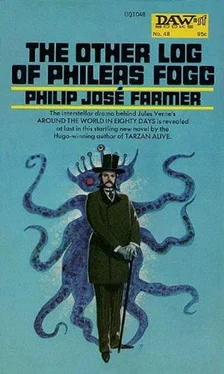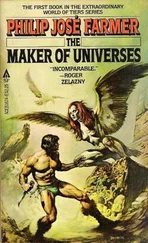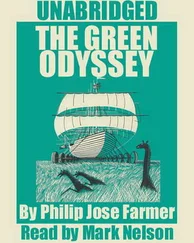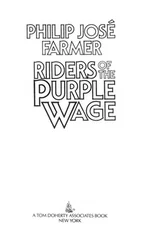Philip Farmer - The Other Log of Phileas Fogg
Здесь есть возможность читать онлайн «Philip Farmer - The Other Log of Phileas Fogg» весь текст электронной книги совершенно бесплатно (целиком полную версию без сокращений). В некоторых случаях можно слушать аудио, скачать через торрент в формате fb2 и присутствует краткое содержание. Жанр: Фантастика и фэнтези, на английском языке. Описание произведения, (предисловие) а так же отзывы посетителей доступны на портале библиотеки ЛибКат.
- Название:The Other Log of Phileas Fogg
- Автор:
- Жанр:
- Год:неизвестен
- ISBN:нет данных
- Рейтинг книги:3 / 5. Голосов: 1
-
Избранное:Добавить в избранное
- Отзывы:
-
Ваша оценка:
- 60
- 1
- 2
- 3
- 4
- 5
The Other Log of Phileas Fogg: краткое содержание, описание и аннотация
Предлагаем к чтению аннотацию, описание, краткое содержание или предисловие (зависит от того, что написал сам автор книги «The Other Log of Phileas Fogg»). Если вы не нашли необходимую информацию о книге — напишите в комментариях, мы постараемся отыскать её.
The Other Log of Phileas Fogg — читать онлайн бесплатно полную книгу (весь текст) целиком
Ниже представлен текст книги, разбитый по страницам. Система сохранения места последней прочитанной страницы, позволяет с удобством читать онлайн бесплатно книгу «The Other Log of Phileas Fogg», без необходимости каждый раз заново искать на чём Вы остановились. Поставьте закладку, и сможете в любой момент перейти на страницу, на которой закончили чтение.
Интервал:
Закладка:
The sled arrived just before the Chicago and Rock Island train was to leave. Fogg and party boarded it and so arrived in Chicago at four in the afternoon of the next day. This city, partially destroyed in the Great Fire of the eighth and ninth of October, 1871, had been rebuilt with some attention to beauty. The party had no time to inspect the new constructions or to take a drive along the superb Lake Michigan. They had nine hundred miles to go and so departed at once on the Pittsburgh, Fort Wayne, and Chicago Railway. On the evening of the eleventh of December, at eleven o’clock, the train pulled into the New York station. This was near the pier of the Cunard line but, unfortunately, the China had left for Liverpool forty-five minutes ago.
Fogg seemed to be beaten. The Inman liner would not leave until the following day and was not fast enough to make up the lost time. The Hamburg ships went directly to Le Havre, France, which meant that the trip from Le Havre to Southhampton and thence to London would make him too late. A French liner did not depart until the fourteenth.
Mr. Fogg only said, “Tomorrow, we will consult about what is best. Come.”
They took the Jersey City ferry over the Hudson and a carriage to the St. Nicholas Hotel on Broadway. The next morning, Mr. Fogg went out alone (according to Verne). Actually, Passepartout trailed him by about sixty feet to detect any shadowers or intercept any Capellean assassins. If Proctor had been sent to kill Fogg, it seemed unlikely that another attempt would not be made in New York. Yet, nothing of this nature happened. Perhaps Proctor was after all only a Western ruffian. But why were the Capelleans leaving him alone? What was behind this? If one thing was sure, they had not given up on him.
Mr. Fogg inquired along the banks of the Hudson for any vessels that seemed about to depart. There were many of this kind, recalling Whitman’s phrase of “many-masted Manhattan,” but sailing ships would be too slow. At the end of his quest, Fogg saw, anchored at the Battery, a steam-driven freighter with the usual auxiliary sails. The puffs of smoke from its stack indicated that it would soon be leaving. Fogg hired a boat and was rowed to the Henrietta. It was bound for Bordeaux and was carrying only ballast for this trip. Its captain, Andrew Speedy (neither Capellean nor Eridanean despite his functional name), loathed passengers. He refused to take Fogg and party at any price nor would he think of going anywhere but to Bordeaux. However, at the offer of two thousand dollars for each passenger, Speedy relented. As Verne says, passengers at this price are no longer passengers but valuable merchandise.
Speedy gave Fogg an unalterable half hour to get all aboard. Fogg hurried in a cab to the hotel and returned with the others just in time. (New York was having traffic problems even in 1872, but the fact that Fogg was able to make such speed shows that the problem was not as bad as now. Or perhaps Fogg ignored all traffic laws.) An hour later, the Henrietta passed the lighthouse marking the entrance to the Hudson, turned past Sandy Hook, and was in the sea.
Passepartout, it can be presumed, regretted not having been able to tour Manhattan. Due largely to immigration from Europe, New York City held a million people. It was, generally, a dirty, drab, drunken, corruptly governed city with many slums. Muggings, killings, brawls, and mob violence were common. The guidebooks warned newcomers not to walk out at night except in better areas well lit by gas. Despite this, the visitor with means might enjoy it. Passepartout would have liked to drive through the recently constructed Central Park, even if slums did ring it. Trinity Church was the tallest structure in town and, though it would be nothing unusual in London, it was notable in contrast with its surroundings. Passepartout might also have wanted to view the new residential areas with their brownstone fronts and the business sections with their cast-iron façades. He could have compared the mass-transportation problems vexing New York City with those vexing London. If he had talked to the Gothamites, he would have heard rumors of gunrunning to Cuban revolutionaries and the seriousness of the epizootic disease which was killing horses. He would have noted that it was only because of this “horse influenza” that Manhattan’s streets in summer were not as foul with manure and the air as thick with huge horseflies and a compound of dust, coal smoke, and manure particles as were London’s.
All this was not to be. Passepartout also had more to think about than the rather sleazy exotica of Baghdad-on-the-Hudson. Mr. Fogg had locked Captain Speedy up in the master’s own quarters.
Mr. Fogg, seeing that Speedy was adamant about not changing his course to Liverpool, had bribed the crew to cooperate with him. This was, as Speedy screamed behind his door, mutiny on the high seas and piracy, the penalty of which was hanging by the neck until dead. Fogg heard him with his customary serenity and continued to give orders from the bridge. It is here that Verne says (truly) that Fogg’s management of the craft showed that he had once been a sailor.
As for Fix, he was fighting a tendency to admire Fogg more and more. He was also wondering why he had received no orders in New York concerning Fogg. Doubtless, Nemo had changed his plans, but it would be nice to know what was going on. Perhaps one of the crew was a fellow Capellean charged with killing the Eridaneans even if he had to blow up the vessel to do it. Fix did not like to contemplate this plan, since it would mean his own demise. And, to tell the truth, he admitted, he was getting more and more excited about the wager. Several times, he had to remind himself that he had no business rooting for the chap.
On the sixteenth of December, half the trip across the Atlantic was behind the Henrietta . She had passed safely through the Newfoundland Fogs and a storm. But now the chief engineer informed Fogg that the fuel supply was running out. The ship did have enough coal to go on “short steam” at a reduced speed to Liverpool. The furnaces were still on “lull steam.”
Fogg, after some deliberation, told the engineer to keep the fires at maximum until the coal was all gone. On the eighteenth, Fogg was told that the fuel would be exhausted sometime that day.
Near noon, Fogg sent for the captain. His face purple, Speedy bounded onto the bridge. “Where are we?” he cried.
“Seven hundred and seven miles from Liverpool,” Fogg said calmly.
“Pirate!”
“Sir, I have sent for you…”
“Pickaroon!”
“…to ask you to sell me the ship.”
“By all the devils, no!”
“Then I shall be forced to burn her.”
“What, burn the Henrietta!”
“The upper part at least. The coal has run out.”
“Burn my ship? A ship worth fifty thousand dollars!”
“Here are sixty thousand,” Fogg said. He handed him the money.
Here Verne makes his classical remark: “An American can hardly remain unmoved at the sight of sixty thousand dollars.”
True, but Verne’s ethnicism is evident in this statement. Few of any nationality, then or today, would not be emotionally affected on being presented with this sum.
Speedy forgot his hate. Money, more than music, soothes the savage beast. He was getting by far the best of the bargain.
“I will still have the iron hull?” he said.
“The iron hull and the engine. I am only buying the wood and all other combustible substances. Is it agreed?”
Fogg then gave the order to strip off all the interior seats, bunks, frames and other furniture and to put them into the furnaces.
The next day, the nineteenth, the fires received the masts, spars, and rafts. On the twentieth, the railings, fittings, and most of the deck and upper sides followed. On this day, the hulk was within sight of the Irish coast and the Fastnet lighthouse. At ten that evening, Queenstown appeared. This was the Irish port where trans-Atlantic steamers put in to deliver the mail. From there express trains sped to Dublin, from which the mail was carried by fast boat to Liverpool. This route got the mail into London twelve hours ahead of the ships.
Читать дальшеИнтервал:
Закладка:
Похожие книги на «The Other Log of Phileas Fogg»
Представляем Вашему вниманию похожие книги на «The Other Log of Phileas Fogg» списком для выбора. Мы отобрали схожую по названию и смыслу литературу в надежде предоставить читателям больше вариантов отыскать новые, интересные, ещё непрочитанные произведения.
Обсуждение, отзывы о книге «The Other Log of Phileas Fogg» и просто собственные мнения читателей. Оставьте ваши комментарии, напишите, что Вы думаете о произведении, его смысле или главных героях. Укажите что конкретно понравилось, а что нет, и почему Вы так считаете.












